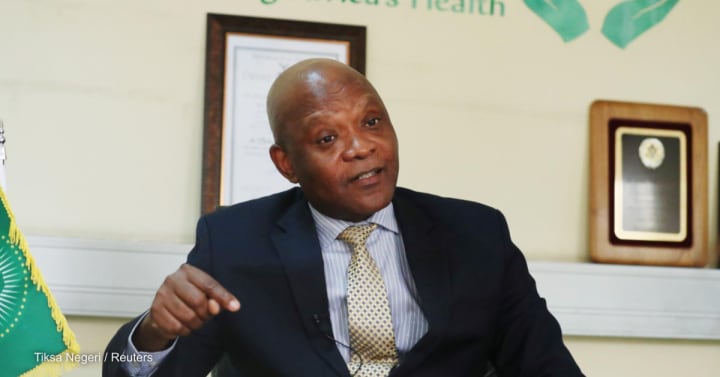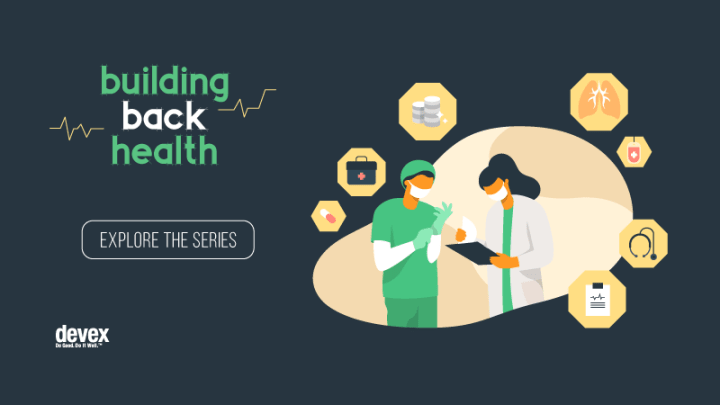
Resilient health systems are not only necessary for the achievement of universal health coverage and the provision of quality health care — they’re also a must for global health security, as demonstrated by the COVID-19 pandemic.
Yet, health systems need to look closer to home to build that resilience. As outlined in an introduction to a June 2020 African Development Institute e-seminar: “Health is local. Global agendas and global policies need to be domesticated and adapted to local conditions.” Indeed, crises such as the 2014-16 Ebola outbreaks in West Africa showed the importance of resilient health systems to prevent, detect, and respond while continuing to provide essential routine and emergency health services.
But a resilient and inclusive health system goes beyond treating the symptoms of disease in order to save lives — it includes the full cycle of preventing disease in the first place to actually improve lives in an “absorptive, adaptive, reflexive, and transformative” manner.
This can be done by prioritizing the training of a capable workforce, investing in robust and cost-effective surveillance systems, and creating financial accountability and good governance working to strengthen health efforts, as highlighted by a 2019 study of resilient health systems in sub-Saharan Africa.
Devex spoke to Dr. John Nkengasong, director of Africa Centres for Disease Control and Prevention, about what it takes to build strong public health institutions to future-proof the continent’s health systems.
The conversation has been edited for length and clarity.
A paper you co-authored in The Lancet says that “we need to redesign health systems for resilience” — how can African countries future-proof their health systems to build resilience ahead of the next pandemic?
The best way to prepare for a future pandemic is to adequately invest in the current challenges that we have in Africa, for example, endemic diseases like HIV, TB, and malaria. Then you have the rising tidal wave of noncommunicable diseases and, of course, the emerging and re-emerging infections including antimicrobial resistance, Ebola, and the current pandemic.
There are three things I would like to reflect on about building resilient systems. First of all, do we have strong institutions? We cannot talk about resilient systems without strong public health institutions; they are critical to building resilience. Look at the work that Nigeria’s CDC and Africa’s CDC has done — these public institutions should be strengthened regionally.
“We need people-centered health systems that are very inclusive and begin to disrupt the tendency of dependence of the global south on the global north. We have to disrupt that by regionalizing our health security architectures.”
— Dr. John Nkengasong, director, Africa Centres for Disease Control and Prevention
The second thing is the workforce. You can’t build public health resilience without it. The continent has a very limited public health workforce … so that is the gap that we need to fill. When this pandemic hit in April 2020, Africa CDC had to go to the Peace and Security Council of the [African Union] and convince them to adopt a resolution that would enable us [to] hire a military plane and then take it to [Democratic Republic of the Congo] and pick up eight epidemiologist[s] who were there fighting the Ebola outbreak.
We then took them to Cameroon, Niger, Burkina Faso, Mali … you don’t win a battle with such an approach. You have to really look at this like a health security issue for the continent and build up a workforce at scale.
The third thing is resilience in manufacturing. There are three things that are the cornerstone of health security: diagnostics security, vaccine security, and therapeutic security. If you lack any of those, you have no resilient systems. Zero.
Let’s go back to what we have done in the past: we’ve lived with HIV for 40 years in Africa and each year we conduct about 100 million tests. But there’s absolutely no country in Africa that produces a simple rapid test for HIV.
Why is that relevant for resilience? If we had companies producing that [test] when COVID-19 hit, then you could actually repurpose those companies and adapt them to do diagnostics for any emerging disease.
If you don’t have [that capability], then you have to wait for diagnostics to come from the West and we have seen that when we are challenged collectively and at scale, the landscape becomes very territorial.
Get development’s most important headlines in your inbox every day.
Thanks for subscribing!
In 1996, treatment for HIV/AIDS was available, but it would take 10 years before it was fully accessible in Africa and 12 million people died during that time. That is a lesson that you have to build a resilient system by improving all three securities; vaccine security, diagnostic security, and therapeutic security.
How can we take this opportunity to “build back better,” with an eye on health equity, universal health coverage, and last-mile access?
Equity doesn’t start when you have a pandemic. You do not build your health systems when you need them and you do not bridge the equity gap when you need to. You do it before you need it. Equity starts with regionalizing your health security commodities as much as possible, so that [when a crisis hits] regions can support their own needs. And if they can support their own needs, of course, they can easily support the last mile.
If I have to wait to get a few diagnostic tests from China or the United States to Ethiopia, by the time they get to Addis Ababa and then are taken to a remote area, it’s too late. But if we’re producing locally, then it’s very easy to access the last mile.
We need people-centered health systems that are very inclusive and begin to disrupt the tendency of dependence of the global south on the global north. We have to disrupt that by regionalizing our health security architectures.
How can countries ensure that any backsliding on tackling diseases such as HIV/AIDS, malaria, polio, and tuberculosis is addressed and progress accelerated?
The knock-on effects on TB, HIV, and malaria programs are huge and I’m [still] waiting to see the data on excess deaths due to COVID. If we focus on these syndemics, then in the future you’ll be able to keep doing your HIV programs while you’re fighting a new disease.
More reading:
► AU launches Partnership for African Vaccine Manufacturing
► Opinion: Africa-led solutions to expedite access to COVID-19 vaccines
I really emphasize the need for having national, strong institutions — they must be able to tackle two pandemics at once. Because that’s the nature of the world we live in. There’s absolutely nothing that says that while we are still fighting this pandemic, another disease outbreak or respiratory outbreak may not happen.
The challenge we have now is not like Ebola. Ebola was regional. It was declared a public health emergency of international concern, but it was very regional. When it concerns all of us, approximately 8 billion people, then we all struggle, and then we are fighting, we panic … it doesn’t help us to collectively win the battle. There’s a need to step back and look at our own adaptive change and behavior … recognizing that a threat of this nature anywhere is a threat everywhere.
What would be your call to action when it comes to building back health systems? What’s the one thing you want to see done in Africa and beyond after this pandemic is stabilized?
It would be a call to action to the leadership of the continent that they have to be building back better, bolder, and bigger in the spirit of the new public health order that we are preaching. A new public health order that speaks to all those elements in Africa — and very importantly — the domestic financing of that.
Africa is a resource-limited setting, but if we are creative and innovative we can raise financing on the continent so it becomes predictable in the way [that] we can use it to quickly respond and to everything we have discussed, such as local manufacturing and workforce development. As a continent, we cannot continue to rely on external funding to support our resilient health systems. We have to find innovative ways to generate domestic financing to support those resilient health systems on the continent.
[embedded content]
Visit the Building Back Health series for more coverage on how we can build back health systems that are more effective, more effective, equitable, and preventive. You can join the conversation using the hashtag #BuildBackHealth.

Printing articles to share with others is a breach of our terms and conditions and copyright policy. Please use the sharing options on the left side of the article. Devex Pro subscribers may share up to 10 articles per month using the Pro share tool ( ).
from WordPress https://ift.tt/2S4et2P
via IFTTT

No comments:
Post a Comment